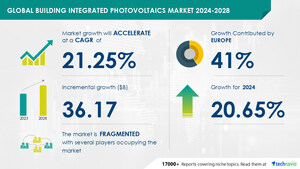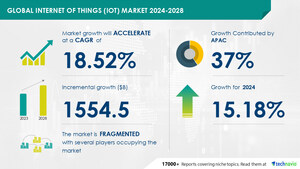NEW YORK, Oct. 31, 2024 /PRNewswire/ -- Report with the AI impact on market trends - The global apparel manufacturing market size is estimated to grow by USD 119.2 billion from 2024-2028, according to Technavio. The market is estimated to grow at a CAGR of 4.3% during the forecast period. Growing e-commerce industry globally is driving market growth, with a trend towards shift toward sustainable and ethical fashion. However, fluctuations in prices of raw materials used in apparel production poses a challenge.Key market players include Aditya Birla Fashion and Retail Ltd., Arvind Ltd., Asian Apparels Ltd., Beximco Apparels Ltd., Crystal International Group Ltd, Epyllion Group., Fakir Apparels Ltd., Gokaldas Exports Ltd., Hongyu Apparel, Jay Dee Exports, Jiangsu Lianfa Textile Co., Ltd., Kitex Garments Ltd, KPR Mill Ltd., LUEN THAI HOLDINGS LTD, MAS Holdings Pvt. Ltd., Plummy Fashions Ltd, Reliance Industries Ltd., Shahi Exports Pvt. Ltd, Vardhman Textile Ltd., and Youngor Group Co., Ltd..
Key insights into market evolution with AI-powered analysis. Explore trends, segmentation, and growth drivers- View the snapshot of this report
Apparel Manufacturing Market Scope |
|
Report Coverage |
Details |
Base year |
2023 |
Historic period |
2018 - 2022 |
Forecast period |
2024-2028 |
Growth momentum & CAGR |
Accelerate at a CAGR of 4.3% |
Market growth 2024-2028 |
USD 119.2 billion |
Market structure |
Fragmented |
YoY growth 2022-2023 (%) |
4.0 |
Regional analysis |
APAC, Europe, North America, Middle East and Africa, and South America |
Performing market contribution |
APAC at 78% |
Key countries |
China, Bangladesh, Italy, Germany, India, Vietnam, Indonesia, Pakistan, Mexico, and Turkey |
Key companies profiled |
Aditya Birla Fashion and Retail Ltd., Arvind Ltd., Asian Apparels Ltd., Beximco Apparels Ltd., Crystal International Group Ltd, Epyllion Group., Fakir Apparels Ltd., Gokaldas Exports Ltd., Hongyu Apparel, Jay Dee Exports, Jiangsu Lianfa Textile Co., Ltd., Kitex Garments Ltd, KPR Mill Ltd., LUEN THAI HOLDINGS LTD, MAS Holdings Pvt. Ltd., Plummy Fashions Ltd, Reliance Industries Ltd., Shahi Exports Pvt. Ltd, Vardhman Textile Ltd., and Youngor Group Co., Ltd. |
The apparel manufacturing market is experiencing a notable transition towards sustainable and ethical fashion. This shift is driven by growing consumer consciousness and industry initiatives. In May 2024, SU.RE (Sustainable Resolution), an Indian industry-led initiative, announced a partnership with the British Council to boost sustainability in the Indian apparel sector. SU.RE, launched in 2019, is the largest voluntary commitment of the Indian apparel industry to sustainability, with 16 major brands pledging to establish sustainable supply chains by 2030. This collaboration includes mentorship sessions, actionable plans, and strategies to help signatories address challenges such as consumer perception and stakeholder alignment. The first phase of this project involved a UK Study Tour, where delegates engaged with sustainable fashion leaders and participated in a leadership roundtable at the Global Fashion Summit in Copenhagen. Globally, consumers are increasingly seeking transparency, ethical practices, and eco-friendly products from apparel brands. This trend is compelling manufacturers to adopt sustainable practices, such as using eco-friendly materials, minimizing waste, and enhancing labor conditions. The apparel manufacturing sector's move towards sustainability is a reaction to both consumer demand and regulatory pressures. As more brands adopt sustainable practices, the industry is expected to continue innovating and collaborating to minimize its environmental impact and promote ethical standards. This trend is poised to shape the future of fashion, making sustainability a crucial aspect of the global apparel manufacturing market during the forecast period.
The apparel manufacturing market is witnessing various trends in 2023. Fashion preferences continue to evolve with a growing interest in traditional ethnic attire and minimalist fashion. Technology is transforming the industry with innovations like 3D printing and artificial intelligence. Fast fashion remains popular, while luxury and premium kids wear are on the rise. Digital marketing strategies, including social media, are essential for retailers. Women's apparel, children's apparel, sportswear, and online sales dominate the market. Eco-friendly materials like organic cotton and recycled fabrics are in demand. Apparel imports and exports are significant, with advertising strategies focusing on textile quality and clothing demand. Direct-to-Consumer (D2C) sales are increasing, and sustainability is a key concern. Overall, the apparel market is dynamic, with constant changes in trends and consumer preferences.
Request Sample of our comprehensive report now to stay ahead in the AI-driven market evolution!
• The global apparel manufacturing market experiences considerable challenges due to the unpredictability of raw material prices. Since January 2024, cotton prices have experienced a significant increase of over 15% globally and 75% domestically, as reported by The Southern India Mills Association (SIMA). This volatility disrupts apparel manufacturers' cost structures, leading to increased production costs and potential pricing pressures on end products. In Q2 2024, Polyester Staple Fiber (PSF) prices in the APAC region saw a notable rise, driven by factors like international crude oil price escalation and feedstock component cost increases. The instability in PSF prices can lead to higher production costs, consumer price increases, and potential demand reduction. Apparel manufacturers must adopt strategic measures, such as diversifying raw material sources, implementing cost-control mechanisms, and exploring alternative materials, to mitigate these challenges. Additionally, fostering strong relationships with suppliers and investing in advanced forecasting and inventory management systems can help manage the impact of raw material price fluctuations. Overall, the volatility in raw material prices poses a significant challenge to the growth of the global apparel manufacturing market, requiring proactive strategies to ensure stability and sustained industry growth.
• The apparel manufacturing market faces various challenges in today's dynamic business environment. Fashion preferences constantly shift, requiring companies to stay updated and adapt quickly. Traditional ethnic attire and fast fashion coexist, pushing for innovation in design and production. Technology trends like 3D printing and artificial intelligence reshape the industry. Retailers grapple with increasing competition from e-commerce and online sales. Luxury and women's fashion sectors seek new advertising strategies. Children's apparel, sportswear, and minimalist fashion also present opportunities. Apparel imports and exports require effective textile sourcing and logistics management. Sustainability is a growing concern, with eco-friendly materials like organic cotton and recycled fabrics gaining popularity. Direct-to-Consumer (D2C) models and social media marketing are essential for reaching customers. Fashion trends and clothing demand remain unpredictable, requiring continuous adaptation.
Discover how AI is revolutionizing market trends- Get your access now!
This apparel manufacturing market report extensively covers market segmentation by
- Product
- 1.1 Women apparel
- 1.2 Men apparel
- 1.3 Children apparel
- Type
- 2.1 Casual wear
- 2.2 Formal wear
- 2.3 Sport wear
- 2.4 Night wear
- Geography
- 3.1 APAC
- 3.2 Europe
- 3.3 North America
- 3.4 Middle East and Africa
- 3.5 South America
1.1 Women apparel- The women's apparel segment in the global apparel manufacturing market is extensive and varied, encompassing numerous styles and preferences. This sector includes categories such as formal wear, casual wear, activewear, and outerwear, each designed to address the specific requirements of women in various situations and activities. On February 20, 2024, Pantaloons, a renowned brand under Aditya Birla Fashion, launched Honey Curvytude, a plus-size clothing line. This collection emphasizes inclusivity and body positivity, empowering women to feel confident in their curves. The Inked in Ikat collection, part of this debut, showcases traditional Ikat weaves on loose, fusion-style dresses, merging cultural heritage and contemporary fashion. The line offers a range of Western wear silhouettes, including babydoll dresses, ruffled blouses, and tailored trousers, catering to office wear, leisure, and smart casual occasions. Pantaloons distributes its products via a comprehensive network of physical retail outlets throughout India and its online direct-to-customer platform. This dual distribution strategy broadens the brand's reach and offers shoppers convenient purchasing options. In November 2023, Pantaloons opened the Pantaloons On Loop store in JP Nagar, Bengaluru, integrating technology into the shopping experience. This store features over 50 brands and caters to Gen Z shoppers' preferences, enhancing customer engagement and ensuring a seamless shopping experience. The women's apparel market continues to evolve, influenced by changing consumer preferences and lifestyle trends. Brands prioritize inclusivity and diversity, providing a wide array of sizes and styles to accommodate various body types. The emergence of plus-size collections, like Honey Curvytude, symbolizes this shift towards more inclusive fashion. Furthermore, the fusion of traditional elements, such as Ikat weaves, into modern designs highlights the growing popularity of fusion fashion. The expansion of retail spaces and the implementation of technology in stores, as demonstrated by the Pantaloons On Loop store, reflect a move towards more engaging and interactive shopping experiences. This modern approach appeals to tech-savvy consumers and fosters brand loyalty by offering a unique and personalized shopping environment. In conclusion, the women's apparel segment remains a dynamic and essential component of the global apparel manufacturing market. Brands are consistently innovating to cater to women's diverse needs, ensuring a vibrant and competitive market that will continue to drive growth throughout the forecast period.
Download a Sample of our comprehensive report today to discover how AI-driven innovations are reshaping competitive dynamics
The apparel manufacturing market is experiencing significant growth, driven by the rise of online shopping and e-commerce platforms. Consumers are increasingly turning to the convenience of buying apparel online, leading in demand for women's fashion, luxury, and children's apparel. Fashion trends continue to evolve rapidly, with a focus on eco-friendly materials such as organic cotton and recycled fabrics. Advertising strategies are shifting towards social media and direct-to-consumer (D2C) sales. Fast fashion continues to dominate the market, but there is growing demand for minimalist fashion and traditional ethnic attire. Technology is also playing a role, with innovations such as 3D printing, artificial intelligence, and digital marketing transforming the industry. Textile exports remain a significant revenue source, but apparel manufacturers must adapt to changing consumer preferences and sustainability concerns to stay competitive.
The apparel manufacturing market is experiencing significant growth, driven by the rise of online shopping and e-commerce platforms. Consumers are increasingly turning to the convenience of buying clothing items online, leading in demand for women's apparel, luxury fashion, and children's clothing. Fashion trends continue to evolve, with a focus on eco-friendly materials such as organic cotton and recycled fabrics. Advertising strategies are shifting towards digital marketing, social media, and influencer partnerships. Textile innovation is at the forefront of the industry, with advancements in 3D printing, artificial intelligence, and fast fashion production. Retailers are embracing direct-to-consumer (D2C) models and exploring new markets for apparel exports and imports. The market is diverse, encompassing everything from traditional ethnic attire to premium kids wear, athleisure, and minimalist fashion. Clothing demand remains strong, with fashion preferences influencing the industry's direction. Apparel exports and imports continue to play a significant role in the global economy, with countries specializing in specific areas such as luxury fashion or textile production.
1 Executive Summary
2 Market Landscape
3 Market Sizing
4 Historic Market Size
5 Five Forces Analysis
6 Market Segmentation
- Product
- Women Apparel
- Men Apparel
- Children Apparel
- Type
- Casual Wear
- Formal Wear
- Sport Wear
- Night Wear
- Geography
- APAC
- Europe
- North America
- Middle East And Africa
- South America
7 Customer Landscape
8 Geographic Landscape
9 Drivers, Challenges, and Trends
10 Company Landscape
11 Company Analysis
12 Appendix
Technavio is a leading global technology research and advisory company. Their research and analysis focuses on emerging market trends and provides actionable insights to help businesses identify market opportunities and develop effective strategies to optimize their market positions.
With over 500 specialized analysts, Technavio's report library consists of more than 17,000 reports and counting, covering 800 technologies, spanning across 50 countries. Their client base consists of enterprises of all sizes, including more than 100 Fortune 500 companies. This growing client base relies on Technavio's comprehensive coverage, extensive research, and actionable market insights to identify opportunities in existing and potential markets and assess their competitive positions within changing market scenarios.
Technavio Research
Jesse Maida
Media & Marketing Executive
US: +1 844 364 1100
UK: +44 203 893 3200
Email: [email protected]
Website: www.technavio.com/
SOURCE Technavio

WANT YOUR COMPANY'S NEWS FEATURED ON PRNEWSWIRE.COM?
Newsrooms &
Influencers
Digital Media
Outlets
Journalists
Opted In





Share this article